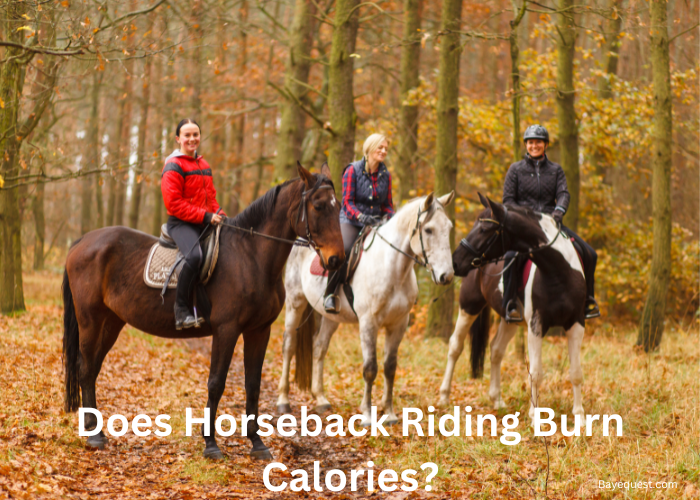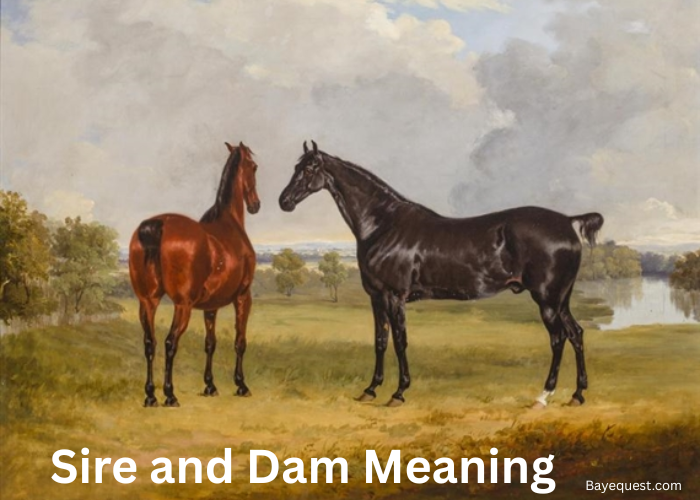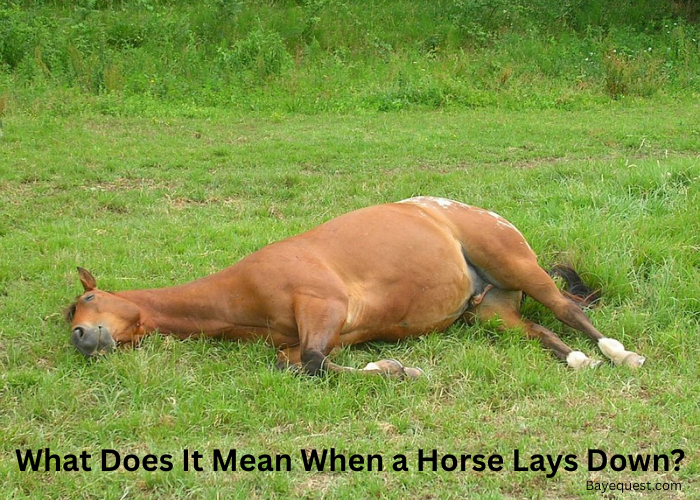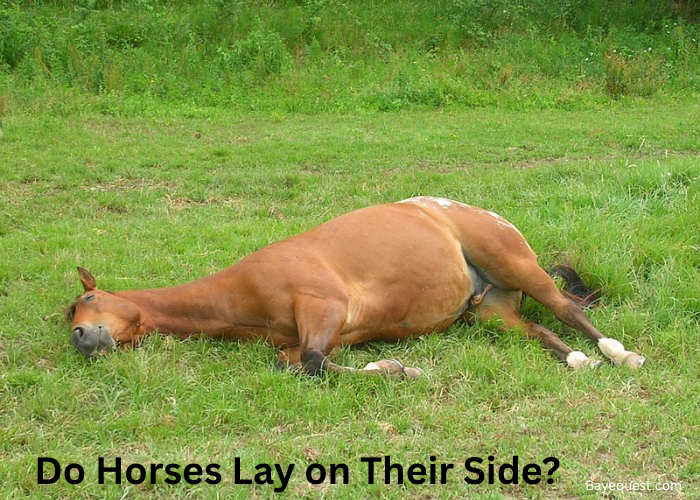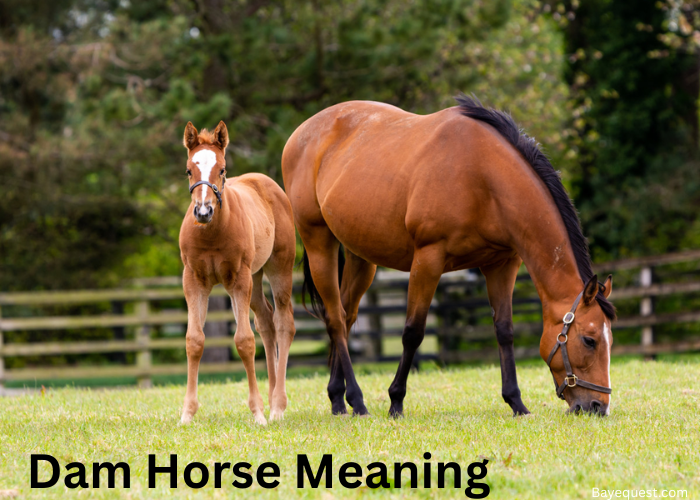Riding a horse isn’t just a fun way to explore the outdoors. It’s a workout in disguise.
Your core tightens, your legs grip, and your balance works overtime. Every stride keeps your muscles engaged. And yes, calories are burning.
Whether you’re galloping or simply staying steady in the saddle, it’s a full-body effort. You’ll use muscles you never knew existed.
Curious how many calories horseback riding burns? You might be surprised by the numbers.
Let’s break down the workout behind the ride.
Does Horseback Riding Burn Calories? Key Takeaway
Yes, horseback riding burns calories and strengthens your body. A relaxed ride burns 300-400 calories per hour. Trotting, cantering, or jumping burns 500-700 calories. It works your core, legs, and arms, improving fitness and balance. Horseback riding is more than fun, it’s a full-body workout that keeps you active.
Understanding Horseback Riding as a Physical Activity
Horseback riding is more than sitting on a horse and letting it do all the work. It’s a full-body exercise that engages muscles you might not use daily.
When you ride, your legs are constantly gripping to stay steady. Your core works hard to keep you balanced as the horse moves beneath you.
Your arms and shoulders are engaged as you guide and steer. Even at a walk, you’re using strength and control.
As you move into a trot or canter, the intensity ramps up. You’re posting up and down, shifting with the rhythm, which takes effort.
It’s not just about staying on; it’s about staying in sync with the horse’s movements.
The terrain also adds to the challenge. Riding uphill or downhill requires different muscles and balance.
So, whether you’re on a gentle ride or a fast-paced gallop, horseback riding keeps your body engaged.
It’s a workout wrapped in adventure, requiring strength, balance, and focus.
How Horseback Riding Burns Calories
Horseback riding burns calories by keeping your body active and engaged the whole time you’re in the saddle.
Think of it like this: every time the horse moves, you move too.
At a walk, you balance, using your core muscles to stay steady. At a trot, you post up and down, which is like doing mini-squats over and over again.
And when you’re cantering or galloping, you’re gripping with your legs, steering with your arms, and holding your position with your core.
The riding you do matters too. A relaxed trail ride will burn fewer calories than a fast-paced jumping session.
The duration also plays a role, the longer you ride, the more calories you burn. And don’t forget the rider’s weight; a heavier rider uses more energy.
How Many Calories Does Horseback Riding Burn?
The calories burned during horseback riding can vary depending on several factors, such as the type of riding, your weight, and the intensity of the session.
On average, a leisurely ride at a walk might burn about 200 to 300 calories per hour for a person weighing around 150 pounds.
But if you pick up the pace to a trot, you could look at around 350 to 450 calories per hour.
For more intense riding, like cantering, galloping, or jumping, the burn goes even higher, up to 500 or 600 calories or more per hour.
Competitive riders, who use different riding techniques and speeds, can burn even more.
Just like in any workout, the harder you push, the more you burn.
How to Calculate the Calories Burned in Horse Riding
Calculating the calories burned while horseback riding isn’t an exact science, but there’s a formula that can help you estimate it.
The general formula for calories burned per minute is:
Calories burned per minute = (MET value x body weight in kg x 3.5) / 200
The MET (Metabolic Equivalent of Task) value changes depending on the intensity of the activity. For horseback riding, the MET value varies:
- Walk or casual ride: around 3.8 METs
- Trotting or moderate ride: about 5.0 METs
- Cantering, galloping, or jumping: approximately 7.3 METs
Let’s say you weigh 70 kg (about 154 pounds) and you’re doing a moderate ride with a MET of 5. The calculation would look like this:
Calories burned per minute = (5 x 70 x 3.5) / 200 = 6.125 calories per minute
If you ride for an hour, you multiply that number by 60, burning about 367 calories. The formula can be adjusted based on your weight and the type of riding.
Calorie Burn Guide for Horseback Riding and Related Activities
| Type of Activity | MET Value | Calories Burned per Hour (70 kg/154 lbs) |
| Horse cart driving, standing or sitting | 1.8 | 284 |
| Horseback riding, walking | 3.8 | 599 |
| Horse racing, walking | 3.8 | 599 |
| Rodeo sports, general, light effort | 4.0 | 630 |
| Horse chores (feeding, watering, cleaning stalls) | 4.3 | 677 |
| Saddling, cleaning, grooming, harnessing, and unharnessing | 4.5 | 709 |
| Horseback riding, general | 5.5 | 866 |
| General rodeo sport, moderate | 5.5 | 866 |
| Horseback riding, trotting | 5.8 | 914 |
| Horse racing, trotting | 5.8 | 914 |
| General rodeo sports, vigorous | 7.0 | 1103 |
| Horseback riding, canter or gallop | 7.3 | 1150 |
| Horse grooming | 7.3 | 1150 |
| Horse racing, galloping | 7.3 | 1150 |
| Polo, on horseback | 8.0 | 1260 |
| Horseback riding, jumping | 8.0 | 1260 |
Related read: Types of Equestrian Competition.
Health Benefits of Horseback Riding
Horseback riding offers a wide range of health benefits that go beyond just the thrill of the ride.
Here’s how this activity supports both physical and mental well-being:
Supports calorie burn
Riding a horse isn’t just sitting in the saddle. It engages multiple muscle groups and requires constant adjustments to stay balanced, which burns calories.
Whether it’s a leisurely ride or a more intense session, you’re working your body and shedding calories.
Promotes physical wellness
Horseback riding is a full-body workout. It helps in building overall stamina and endurance.
Riding regularly can improve your fitness levels, boost metabolism, and keep you in shape.
Improves core, legs, and arms strength
Staying balanced on a moving horse requires a strong core. Your legs grip to stay steady, and your arms help guide and steer.
Over time, this builds muscle strength in the core, legs, and arms, leading to improved muscle tone and strength.
Relieves stress and anxiety
Being around horses and riding them can have a calming effect. The rhythmic motion, fresh air, and focus required while riding can help reduce stress and anxiety.
The bond with the horse also promotes emotional well-being, offering a therapeutic escape from daily life.
Offers cardiovascular benefits
Horseback riding can get your heart pumping, especially during more vigorous activities like cantering or jumping.
It helps improve cardiovascular fitness, enhances circulation, and can contribute to a healthier heart.
Improves coordination
Riding a horse involves coordinating your movements with the horse’s rhythm.
This enhances your coordination skills as you learn to cue the horse with your hands, legs, and body position, improving overall body control.
Improves posture
Maintaining a good posture is key when riding.
Over time, horseback riding can help improve your posture by strengthening the muscles that support your spine and encouraging an upright position.
Encourages companionship and connection with the horse
Riding is not just about physical benefits; it also fosters a unique bond between the rider and the horse.
Building trust and communication with the horse can be fulfilling and offers a sense of companionship that’s good for emotional health.
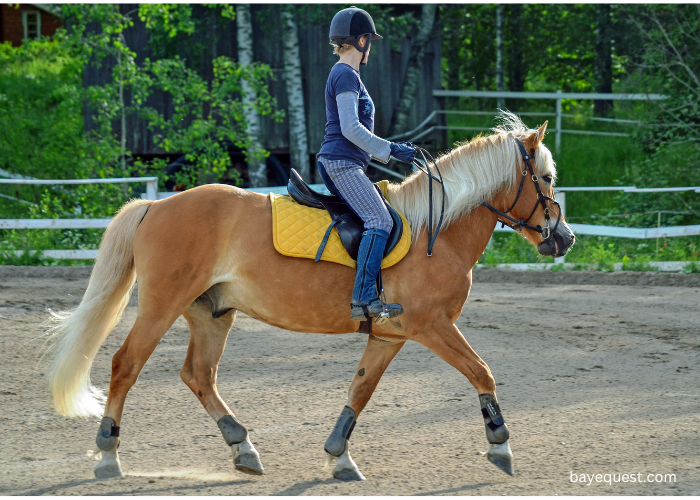
Tips to Maximize Calorie Burn While Horseback Riding
Maximizing calorie burn while horseback riding involves a mix of technique, intensity, and variety.
Here are some effective tips to help you make the most out of your riding sessions:
- Incorporate more intense riding techniques
- Extend your riding sessions
- Ride on varied terrain
- Include interval training
- Engage in off-horse exercises
- Improve your riding technique
- Participate in competitive riding or advanced disciplines
- Stay consistent and challenge yourself
FAQs
Does riding a horse burn more calories than riding a bike?
Yes, intense horseback riding, such as cantering or galloping, can burn more calories than moderate bike riding. Leisure horseback riding (walking or light trotting) burns about 300-400 calories per hour, while vigorous horseback riding (jumping or fast cantering) can burn 500-600 calories, surpassing moderate cycling’s calorie burn.
Does riding a horse burn more calories than jogging?
Yes, intense horseback riding, like jumping or galloping, can burn more calories than moderate jogging. While moderate jogging burns around 500-600 calories per hour, vigorous horseback riding can reach up to 600-700 calories per hour. However, casual horseback riding burns fewer calories than jogging.
Is horseback riding a sport?
Yes, horseback riding is a sport. It takes skill, strength, and balance to control a horse. Riders train hard to compete in events like jumping, dressage, and rodeo. It’s not just sitting in a saddle; it’s an athletic activity that challenges both the rider and the horse, requiring focus and teamwork.
Does Horse Back Riding Burn Calories? Conclusion
Absolutely. Whether you’re taking a calm trail ride or racing in a gallop, you’re giving your body a solid workout.
Your core, legs, and arms are all in on the action, burning calories with every stride. Plus, it’s fun, adventurous, and beats a treadmill any day.
It’s not just about sitting on a horse; it’s about moving with it.
So, the next time you ride, remember you’re not just enjoying the view. You’re getting fit, one hoofbeat at a time.




